情态动词表示推测
情态动词表示猜测

He must know my address. 他肯定知道我的地址。 He can`t know my address. 他肯定不知道我的地址。
must 对现在的猜测,must + V原形 我一定是疯了才会说出那些话! I must be crazy for saying those words!
在否定句中,可用于猜测的情态动词有: may/might not, can/ could not 否定语气不肯定时,可用may/might not, 可能不 That means the customers may/might not be respected. 这意味着顾客可能不被尊重。 现在她可能不会在等你。 She may/might not be waiting for you now. 否定语气较强时,则用can/could not, 一定不 树下的那个人肯定不是Mary的男友。 The man under the tree couldn't be Mary's BF. 在疑问句中,可用于猜测的情态动词只有can/could,不可 用may/might How could you be so rude? What can he mean?
对已经完成的动作的猜测,“可能已经” may/ might/ could have done 那些学生可能之前已经看过那部电影了。 Those students may/ might/ could have seen that film before. e.g. --I've taken someone else's green sweater by mistake. --It ___ Harry's. He aways wears green. A. has to be B. may be C. mustn't be D. would be
情态动词表示推测的用法
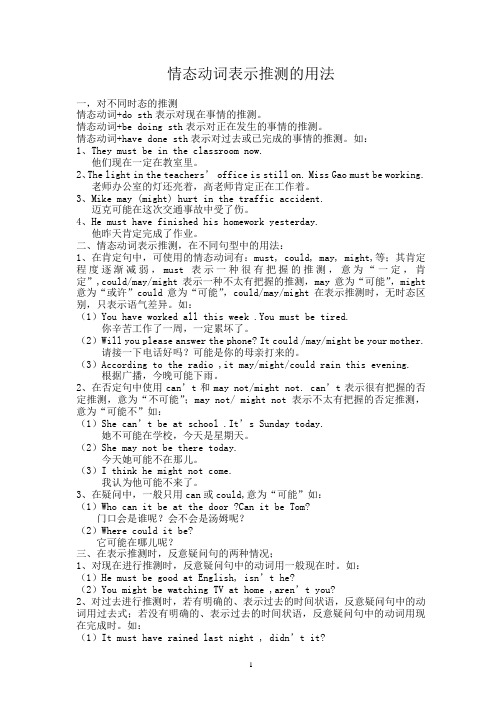
情态动词表示推测的用法一,对不同时态的推测情态动词+do sth表示对现在事情的推测。
情态动词+be doing sth表示对正在发生的事情的推测。
情态动词+have done sth表示对过去或已完成的事情的推测。
如:1、They must be in the classroom now.他们现在一定在教室里。
2、The light in the teachers’office is still on. Miss Gao must be working.老师办公室的灯还亮着,高老师肯定正在工作着。
3、Mike may (might) hurt in the traffic accident.迈克可能在这次交通事故中受了伤。
4、He must have finished his homework yesterday.他昨天肯定完成了作业。
二、情态动词表示推测,在不同句型中的用法:1、在肯定句中,可使用的情态动词有:must, could, may, might,等;其肯定程度逐渐减弱,must表示一种很有把握的推测,意为“一定,肯定”,could/may/might表示一种不太有把握的推测,may意为“可能”,might 意为“或许”could意为“可能”,could/may/might在表示推测时,无时态区别,只表示语气差异。
如:(1)You have worked all this week .You must be tired.你辛苦工作了一周,一定累坏了。
(2)Will you please answer the phone? It could /may/might be your mother.请接一下电话好吗?可能是你的母亲打来的。
(3)According to the radio ,it may/might/could rain this evening.根据广播,今晚可能下雨。
2、在否定句中使用can’t和may not/might not. can’t表示很有把握的否定推测,意为“不可能”;may not/ might not 表示不太有把握的否定推测,意为“可能不”如:(1)She can’t be at school .It’s Sunday today.她不可能在学校,今天是星期天。
情态动词表示推测
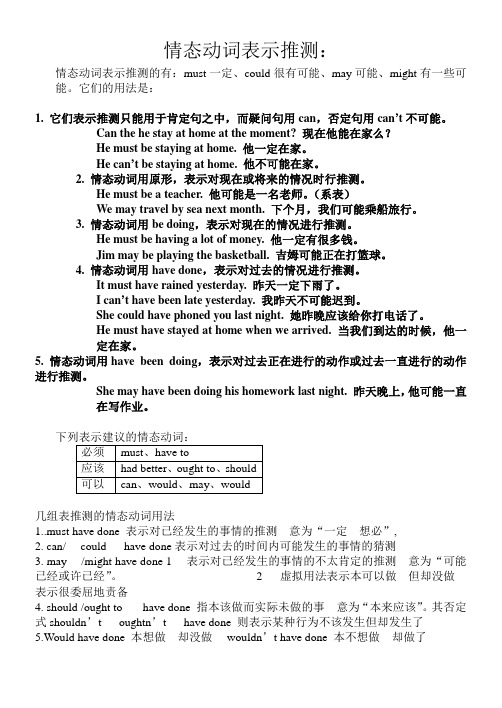
情态动词表示推测:情态动词表示推测的有:must一定、could很有可能、may可能、might有一些可能。
它们的用法是:1. 它们表示推测只能用于肯定句之中,而疑问句用can,否定句用can’t不可能。
Can the he stay at home at the moment? 现在他能在家么?He must be staying at home. 他一定在家。
He can’t be staying at home. 他不可能在家。
2. 情态动词用原形,表示对现在或将来的情况时行推测。
He must be a teacher. 他可能是一名老师。
(系表)We may travel by sea next month. 下个月,我们可能乘船旅行。
3. 情态动词用be doing,表示对现在的情况进行推测。
He must be having a lot of money. 他一定有很多钱。
Jim may be playing the basketball. 吉姆可能正在打篮球。
4. 情态动词用have done,表示对过去的情况进行推测。
It must have rained yesterday. 昨天一定下雨了。
I can’t have been late yesterday. 我昨天不可能迟到。
She could have phoned you last night. 她昨晚应该给你打电话了。
He must have stayed at home when we arrived. 当我们到达的时候,他一定在家。
5. 情态动词用have been doing,表示对过去正在进行的动作或过去一直进行的动作进行推测。
She may have been doing his homework last night. 昨天晚上,他可能一直在写作业。
几组表推测的情态动词用法1..must have done 表示对已经发生的事情的推测 意为“一定 想必”,2. can/ could have done表示对过去的时间内可能发生的事情的猜测3. may /might have done 1 表示对已经发生的事情的不太肯定的推测 意为“可能已经或许已经”。
情态动词表示推测
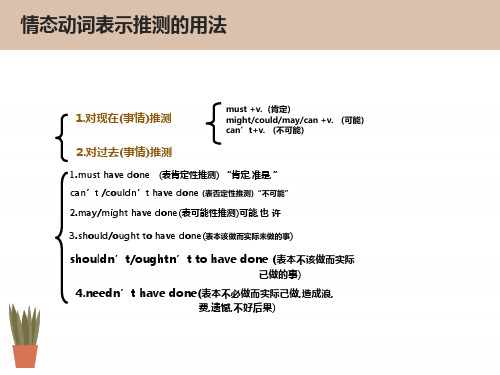
must have done (表肯定性推测) “肯定,准是,” can’t /couldn’t have done (表否定性推测)“不可能” It must have rained last night,for the road is wet.(It can’t/couldn’t have rained last night.)
Ten passangers were in a car!It can’t have been a comfortable jurnery.
(可能性大)
4.He may have gone to Beijing yesterday.
(可能性小)
5He might have gone to Beijing yesterday.
01
There was plenty of time.She needn’t have hurried.
02
You shoulห้องสมุดไป่ตู้ have come to the meeting.
--- He must be Mr. Li.(肯定是)
--No,he can’t be Mr. Li. Mr.Li has
gone to Britain.(不可能是)
We may be late for class.It’s already seven to five.(也许)
You mustn’t play with fire!
另外,在虚拟语气中还有:
02
would have done… 表示“本来会…..”
但实际上并没有发生
情态动词表示推测的用法
1.对现在(事情)推测
2.对过去(事情)推测
情态动词表示“推测”的用法

情态动词表示“推测”的用法英语中,情态动词can / could, may / might, must / can, would / should 等都可以表示“推测”。
具体用法如下:1. can 和couldcan 表示推测时,可能性比较大,用于疑问句或否定句中,不用于肯定句中,意思是“不可能”。
表示一种有把握的推测。
表示否定时,can’t语气最强。
如:It can’t be Mr Li. He has gone to Nanjing already.They can’t know the answer. Let me explain it to them.That can’t be her husband. She is still single.could 表示推测时,可以用于否定句,也可以用在后面跟不定式一般式的肯定句。
表示可能性不大的推测。
意思相当于may / might。
如:Anything could happen if you do not obey the rule.It could be true. But I still doubt it.2. may和mightmay / might 表示一种“可能性很小”的推测。
多用在肯定句或否定句中,might 用在疑问句中表示“可能”,语气最弱。
如:My English teacher may be correcting our exercises in her office.My sister may not be in her room at this moment.The scientists might be discussing the pollution problem.3. must 和can在表示推测的情态动词中,must 的把握最大,意思为“一定,肯定”。
表示对一般情况的推测。
如:Your sister must be a doctor, isn’t she?The boys must be playing football on the playground, aren’t they?Li Ping must be punished by his father.(以上几句要注意其反意疑问句的构成)can的推测用法:在肯定句中can 可以表示客观的(理论的)可能性,并不涉及具体某事是否会发生,此用法常常可以说明人或事物的特征。
解析情态动词表推测

解析情态动词表推测情态动词表推测的三种时态如下:1、对将来情况的推测,用“情态动词+动词原形”。
(1)She must / may / might / could arrive before 5.5:00前她一定/可能/也许到。
2、对现在或一般情况的推测,用“情态动词+be”,“情态动词+be doing”或“情态动词+动词原形”。
(1)He must/may/might/could be listening to the radio now.他一定/可能/也许正在听收音机。
(2)He can't(couldn't)/may(might) not be at home at this time.这个时候他不可能/可能不在家。
3、对过去情况的推测,用“情态动词+ have +过去分词”。
It must/may/might/could have rained last night.The ground is wet.地湿了,昨晚肯定/可能/也许下雨了。
情态动词表推测可能性大小的排列情态动词有must,can/could may/might,can't/couldn't。
表示推测的情态动词有must,can,could,may,might 等,且语气由左向右依次减弱。
could,might并不一定是can,may的过去式,有时只是语气分别比can,may更弱。
常见的表示推测的情态动词:must, could, may, might, may not, can’t1) 表示肯定推测时,可能性:must一定>could 可能>may也许>migh也许,表示对现在发生的事的推测例如:It is 9:00 p.m. She must be at home. 晚上九点了。
她现在一定在家。
注意:must只用于肯定句如果表示“一定不”,用can’t:She can’t be at home. 她一定不在家。
表推测的情态动词及其用法
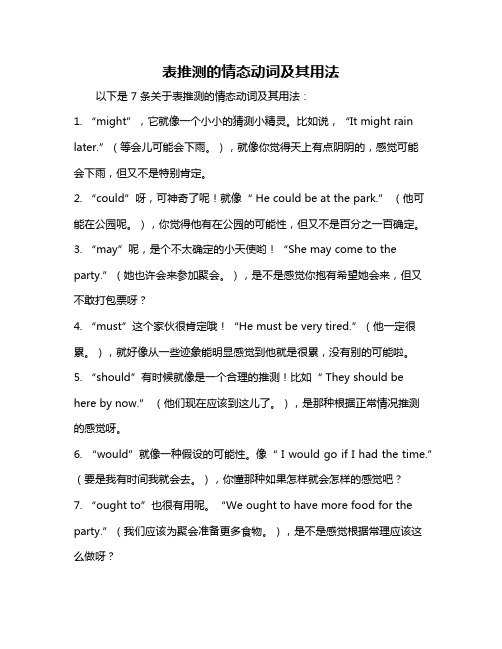
表推测的情态动词及其用法以下是 7 条关于表推测的情态动词及其用法:1. “might”,它就像一个小小的猜测小精灵。
比如说,“It might rain later.”(等会儿可能会下雨。
),就像你觉得天上有点阴阴的,感觉可能会下雨,但又不是特别肯定。
2. “could”呀,可神奇了呢!就像“ He could be at the park.” (他可能在公园呢。
),你觉得他有在公园的可能性,但又不是百分之一百确定。
3. “may”呢,是个不太确定的小天使哟!“She may come to the party.”(她也许会来参加聚会。
),是不是感觉你抱有希望她会来,但又不敢打包票呀?4. “must”这个家伙很肯定哦!“He must be very tired.”(他一定很累。
),就好像从一些迹象能明显感觉到他就是很累,没有别的可能啦。
5. “should”有时候就像是一个合理的推测!比如“ They should behere by now.” (他们现在应该到这儿了。
),是那种根据正常情况推测的感觉呀。
6. “would”就像一种假设的可能性。
像“ I would go if I had the time.” (要是我有时间我就会去。
),你懂那种如果怎样就会怎样的感觉吧?7. “ought to”也很有用呢。
“We ought to have more food for the party.”(我们应该为聚会准备更多食物。
),是不是感觉根据常理应该这么做呀?我觉得啊,这些情态动词让我们的表达更丰富、更灵活,能更好地传达我们心中那种不确定或者推测的感觉,真是太奇妙啦!。
表示“推测”的情态动词
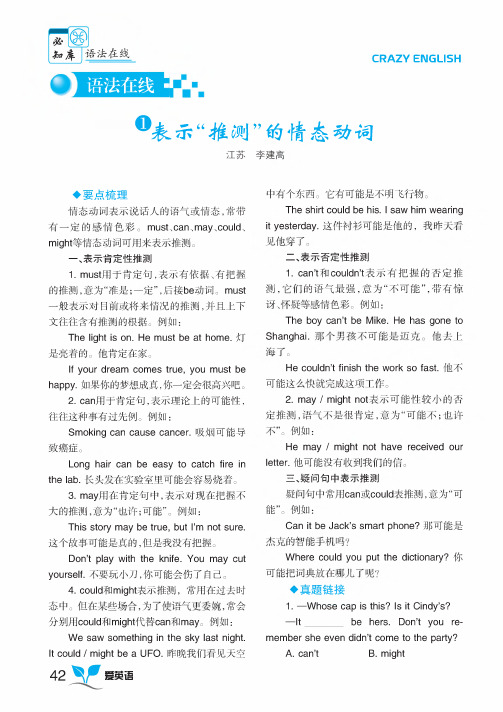
CRAZY ENGLISH❶表示“推测"的情态动词江苏李建咼♦要点梳理情态动词表示说话人的语气或情态.常带有一定的感情色彩。
must、can、may、could、might等情态动词可用来表示推测。
一、表示肯定性推测1.must用于肯定句,表示有依据、有把握的推测,意为"准是;一定",后接be动词。
must 一般表示对目前或将来情况的推测,并且上下文往往含有推测的根据。
例如:The light is on.He must be at home.灯 是亮着的。
他肯定在家。
If your dream comes true,you must be happy.如果你的梦想成真,你一定会很高兴吧。
2.can用于肯定句,表示理论上的可能性,往往这种事有过先例。
例如:Smoking can cause cancer.吸烟可能导致癌症。
Long hair can be easy to catch fire in the lab.在实验室里可能会容易烧着。
3.may用在肯定句中,表示对现在把握不大的推测,意为H;可能”。
例如:This story may be true,but I'm not sure.这个故事可能是真的,但是我没有把握。
Don't play with the knife.You may cut yourself.要玩小刀,你可能会伤了自己。
4.could和might表示推测,常用在过去时态中。
但在,为语气,常会分另U用could和might代替can和may。
例如:We saw something in the sky last night. It could/might be a UFO.昨晚我们看见天空中有个东西。
它有可能是不明飞行物。
The shirt could be his.I saw him wearing it yesterday.这可能是他的,我他。
- 1、下载文档前请自行甄别文档内容的完整性,平台不提供额外的编辑、内容补充、找答案等附加服务。
- 2、"仅部分预览"的文档,不可在线预览部分如存在完整性等问题,可反馈申请退款(可完整预览的文档不适用该条件!)。
- 3、如文档侵犯您的权益,请联系客服反馈,我们会尽快为您处理(人工客服工作时间:9:00-18:30)。
2.may/might have done(表可能性推测)可能,也 许
3.should/ought to have done(表本该做而实际未做的事
dn’t/oughtn’t to have done (表本不该做而实际
已做的事)
4.needn’t have done(表本不必做而实际己做,造成浪,
费,遗憾,不好后果)
情态动词表示推测的用法
1.对现在(事情)推测: must + v. (肯定)
may/might/could/can+v. (可能)
(情态动词+ 动词原形) can’t + v. (不可能)
2.对过去(事情)推测:(情态动词+ 完成式)
must have done (表肯定性推测) “肯定,准是,” can’t /couldn’t have done (表否定性推测)“不可能”
情态动词表示推测的用法
1.对现在(事情)推测 2.对过去(事情)推测
must +v. (肯定) might/could/may/can +v. (可能) can’t+v. (不可能)
1.must have done (表肯定性推测) “肯定,准是,”
can’t /couldn’t have done (表否定性推测)“不可能”
gone to Britain.(不可能是) 2.We may be late for class.It’s already
seven to five.(也许) 3.You mustn’t play with fire!
另外,在虚拟语气中还有:
would have done… 表示“本来会….. ”
hasn’t she? 3.She must have gone to Shanghai
yesterday, didn’t she?
特殊疑问句 疑问词+do you
(插入语)
Think suggest believe imagine suppose say
+主语+谓语
2.---Can it have been a comfortable journey?
3.Ten passangers were in a car!It can’t have been a comfortable jurnery.
4.He may have gone to Beijing yesterday. (可能性大)
It must have rained last night,for the road is wet.(It can’t/couldn’t have rained last night.)
1.It must have rained last night.for the ditch(水道,渠道) is full of water.
You should hav但e 实co际me上e并arl没ier有, o发th生erwise you would have met him.
你本该早点来,否则的话,你就会遇见 他.(实际上没有早来,也没见到他)
must表推测的反意疑问句: 反意问句部分永远不带must.
1.She must be a teacher,isn’t she? 2.She must have gone to Shanghai,
5He might have gone to Beijing yesterday. (可能性小)
6.There was plenty of time.She needn’t have hurried.
7 You should have come to the meeting.
1.--- He must be Mr. Li.(肯定是) ---No,he can’t be Mr. Li. Mr.Li has
